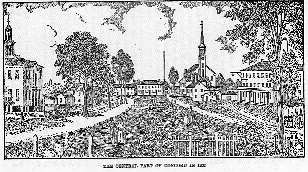Concord.
In 1834, Ralph Waldo Emerson became a resident of Concord. For a year he lived with his mother in the old-fashioned gambrel-roofed house, built as a parsonage for his grandfather, who in his time had served the Concord church. It was this house which subsequently came to be occupied by the novelist Hawthorne, and was given fame in the title of his Mosses from an Old Manse. In 1835, Emerson was married to Miss Lidian Jackson, of Plymouth, and settled in the house, then on the edge of the town, where for almost fifty years he lived his serene and uneventful life.
The quiet village has been a famous place ever since the day when by the rude bridge the "embattled farmers" fought the British soldiers in that first conflict of the Revolutionary war; and its fame has grown more enduring because of the remarkable group of thinkers and writers who made the town their home. To Emerson, the surroundings were peculiarly attractive. From his home a path led through open fields to the shore of beautiful Walden Pond. There was plenty of space about him. Meandering through an expanse of green meadow land crept the sleepy Concord River, the Musketaquid of his poem, between its willow-bordered banks. More than all else he loved the woods; a forty-acre lot of woodland he bought by the shore of Walden that he might feel the sense of possession in it. In My Garden he sings its beauty and significance to him. In constant communion with Nature he wrote of her in prose and verse. To him, God was near in every form of natural life, and he loved to express in his writings the deep spiritual significance of what he saw and heard. He said: --
"I go to the god of the wood
To fetch his word to men.
. . . . .
"There was never mystery
But 't is figured in the flowers;
Was never secret history
But birds tell it in the bowers."1
Among his townsmen, Emerson moved a familiar and a welcome figure. His duties as a citizen and
neighbor were never shirked. Everybody knew the tall, spare man with the slight stoop of the shoulders,
the shrewd, wise, tender face with its smile "like the mild radiance of a hidden sun." Whenever he spoke
in the town hall or in Concord church, they turned out in large numbers to listen to his address with
neighborly pride and due respect--if not with entire comprehension of his utterances. 
Distinguished Neighbors.
There was, too, a circle of intimate friends about him, some, like Bronson Alcott and Margaret Fuller, attracted thither by the presence of one generally recognized as the ablest prophet of transcendentalism. The young and talented Thoreau, a disciple, although a very independent one, early engaged his interest. In 1842, Hawthorne came to Concord, and for five years dwelt in the Old Manse. Occasionally, too, there appeared fantastic dreamers with queer schemes of social reformation in their heads who sought out Emerson in his retreat as if to consult the oracle at some sacred shrine. Altogether, the little New England town became closely identified with that strong intellectual movement which Emerson, more than any other American writer, had inspired.
Nature.
In 1836, there was published anonymously in Boston a little book of about a hundred pages, entitled Nature. This was Emerson's first characteristic utterance through the printed essay. "A reflective prose poem" is what Dr. Holmes calls it: beautiful in its exaltation of spirit, poetical, mystical, vague--incomprehensible, doubtless, to many an unsympathetic reader. It was the first public enunciation of the transcendental principles on which much of the subsequent teaching was based.
"The foregoing generations beheld God and nature face to face; we, through their eyes. Why should not we also enjoy an original relation to the universe? Why should not we have a poetry and philosophy of insight and not of tradition, and a religion by revelation to us, and not the history of theirs?"
| Previous chapter/page | Back | Home | Email this | Search | Discuss | Bookmark | Next chapter/page |
See our FAQ for more details.